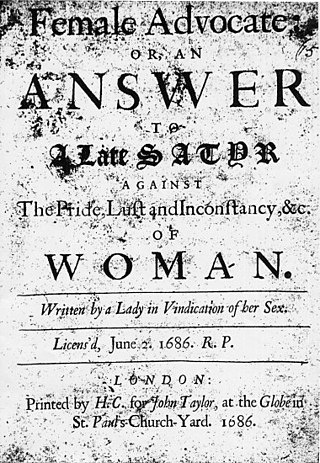This article contains information about the literary events and publications of 1710.
Events from the year 1714 in literature.
This article contains information about the literary events and publications of 1718.
This article is a summary of the major literary events and publications of 1720.
This article contains information about the literary events and publications of 1724.
This article contains information about the literary events and publications of 1705.
This article contains information about the literary events and publications of 1708.
This article contains information about the literary events and publications of 1699.
This article contains information about the literary events and publications of 1698.
This article contains information about the literary events and publications of 1696.
This article contains information about the literary events and publications of 1692.
Charles Gildon, was an English hack writer and translator. He produced biographies, essays, plays, poetry, fictional letters, fables, short stories, and criticism. He is remembered best as a target of Alexander Pope in Pope's Dunciad and his Epistle to Dr. Arbuthnot and as an enemy of Jonathan Swift. Due to Pope's caricature of Gildon as well as the volume and rapidity of his writings, Gildon has become the epitome of the hired pen and literary opportunist.

Delarivier "Delia" Manley was an English author, playwright, and political pamphleteer. Manley is sometimes referred to, with Aphra Behn and Eliza Haywood, as one of "the fair triumvirate of wit", which is a later attribution.

Sarah Fyge Egerton (1668–1723) was an English poet who wrote in the late seventeenth and early eighteenth centuries. In her works The Female Advocate and Poems on Several Occasions, Egerton wrote about gender, friendship, marriage, religion, education, politics, and other topics. She is chiefly known as the spirited teen who responded in defense of women to Robert Gould's misogynist satire.
Events from the year 1709 in Great Britain.
Nationality words link to articles with information on the nation's poetry or literature.
Now the Assembly [the Kit-Kat Club] to adjourn prepar'd,
When Bibliopolo from behind appear'd
As well describ'd by th' old Satyrick Bard,
With leering Looks, Bull-fac'd, and Freckled fair,
With two left Legs; and Judas-colour'd [red] Hair,
With Frowzy Pores, that taint the ambient Air.
Sweating and Puffing for a-while he stood.
And then broke forth in this insulting Mood:
Without my Stamp in vain your Poets write.
Those only purchase everliving Fame,
That in my Miscellany plant their Name.
Nationality words link to articles with information on the nation's poetry or literature.
Now crowds to Founder Bocaj [Jacob Tonson] did resort
And for his Favour humbly made their Court.
The little Wits attended at his Gate
And Men of Title did his Levee wait;
For he, as Sovereign by Prerogative,
Old Members did exclude, and new receive.
He judg'd who most were for the Order fit,
And Chapters held to make new Knights of Wit.
Nationality words link to articles with information on the nation's poetry or literature.
Nationality words link to articles with information on the nation's poetry or literature.
Elizabeth Taylor was a British poet of the Restoration period.



